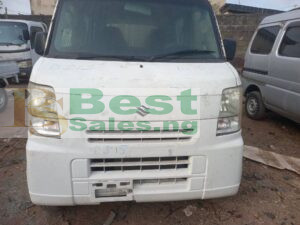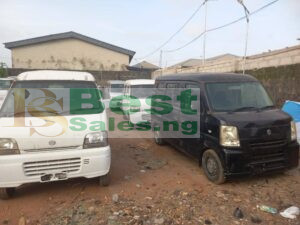As a cornerstone of daily commutes for millions, a good knowledge of used tokunbo mini bus price in Nigeria is paramount for prospective owners and passengers. With variations such as the Suzuki mini bus price in Nigeria reflecting market diversity, these vehicles represent an essential, cost-effective mode of transport, intertwining deeply with the fabric of Nigerian society. The economic implications tied to the price of mini bus in Nigeria extend beyond simple transactions, influencing livelihoods and urban mobility.
Table of Contents
ToggleThis article covers key aspects of Korope buses, starting with an overview and their historical significance within the Nigerian transport landscape. It discusses the role these minibusses play in facilitating movement across cities and rural areas alike, shedding light on their impact on the public transport system and the broader economy. With a detailed examination of the current mini bus price in Nigeria, including cost components and regional price variations, the article provides invaluable insights into the ‘how much is Korope bus’ query among stakeholders. By outlining these essential facets, readers will know Korope bus prices in Nigeria.
Overview of Korope Buses
Types of Korope Buses
Korope buses, prominently featuring models like Suzuki Every, Daihatsu, and Hijet, are integral to Nigeria’s transport system. These buses vary in specifications, offering both automatic and manual transmissions, and are available in 4-wheel and 2-wheel drive options.
Manufacturers and Brands
The Suzuki Every, a popular choice in Nigeria, is part of the broader Suzuki Carry lineup, first introduced in 1961. These buses are imported from Japan and other Asian countries and converted to left-hand drive for use in Nigeria. Other notable mentions include the IVM Shuttle, available in standard and ambulance variants, and the Kia Towner, providing a compact yet functional option for up to eight passengers.
History and Significance of Korope Buses in Nigeria
Emergence and Evolution
Korope buses, originally conceived by Suzuki around the time of Nigeria’s independence in 1960, were designed to accommodate more passengers while consuming less fuel. These 5-seater minibusses undergo significant modifications upon arrival in Nigeria, where they are disassembled, shipped in pieces, and reassembled. This process often involves cutting the vehicles into smaller sections to fit more into shipping containers, which unfortunately reduces their structural strength. Despite these challenges, Korope buses have become a staple in Nigeria’s transportation landscape, primarily due to their ability to navigate tight spaces and their speed in delivering passengers to their destinations.
Uses in Public Transport
Korope buses are predominantly used for intra-state travel due to their compact size and agility, which allows them to maneuver through congested urban environments. They play a crucial role in the public transport system, being the third most utilized mode of transport at 24.9% in certain areas, following motorcycles and private cars. This high usage underscores their importance in facilitating efficient and effective intra-urban mobility, despite their limitations for long-distance travel.
The Role of Korope Buses in Nigerian Transport
Importance in Urban Areas
Korope buses have influenced urban transport dynamics in Nigeria. In densely populated areas like Alekuwodo and IsaleOsun, Korope buses serve as a primary means of transport, with usage rates reaching 44.4% in some regions. They provide essential mobility for residents, especially those without access to private vehicles, facilitating daily commutes to workplaces, markets, and schools. Additionally, in medium to high-density areas such as Agowande and Oke-fia, Korope buses complement other forms of transport by offering reliable and frequent services, which are crucial in areas with under-invested transport infrastructure.
Impact on Rural Transport
In rural settings, the role of Korope buses extends beyond mere transportation. They are pivotal in enhancing access to markets and essential services, thereby supporting local economies. Well-maintained rural roads, as highlighted by studies, significantly boost the efficiency of Korope buses, facilitating smoother travel and access to urban centers. This connectivity is vital for the agricultural sector, allowing for better distribution of produce and access to broader markets, which in turn stimulates economic growth in these areas.
Implications on Public Transport and Economy
Accessibility and Affordability
Korope buses, priced between 870,000 to 1.5 million Naira, offer a cost-effective solution for public transit in regions like Osun, where they are predominantly used. The affordability of these buses is enhanced by the option to purchase used models, which are significantly cheaper. This pricing strategy makes public transport more accessible to a broader segment of the population, ensuring that even during peak times such as rush hours or adverse weather conditions, the fares remain stable and reasonable. This stability in pricing, unlike the fluctuating fares in places like Lagos, contributes to a more predictable and dependable public transportation system.
Economic Impact
The transport sector in Nigeria, with minibusses like Korope playing a significant role, presents substantial economic opportunities. As the primary mode of transport for a significant portion of the Nigerian population, these minibusses not only facilitate daily commutes but also stimulate economic activities by improving access to markets and services. The operation of these buses supports local economies, particularly in rural areas where access to other forms of transport might be limited. Additionally, the low operational costs and high demand for public transit make investing in minibuses a potentially lucrative venture, despite some challenges such as maintenance and competition from unregulated transport services.
Current Mini Bus Price in Nigeria
Brand New Korope Buses
The Suzuki Every, a prominent model in Nigeria, offers different prices based on transmission type. For manual transmission, the prices are as follows:
- Suzuki Every 2WD Manual Transmission: ₦4,500,000
- Another variant of Suzuki Every 2WD Manual Transmission: ₦5,300,000 For automatic transmission, the prices are:
- Suzuki Every 2WD Automatic Transmission: ₦4,900,000
- Another variant of Suzuki Every 2WD Automatic Transmission: ₦5,600,000
Used Tokunbo Korope Buses
The market for used Suzuki Every mini buses, also known as Tokunbo, varies by year of manufacture: You can buy korope buses for sale in Nigeria on BestSales.
| Tokunbo Mini Bus Korope | Year of Manufacture | Prices |
|---|---|---|
| Suzuki Every | 2000 | ₦2,600,000 – ₦2,700,000 |
| Suzuki Every | 2001 | ₦2,600,000 – ₦2,700,000 |
| Suzuki Every | 2002 | ₦2,700,000 – ₦2,800,000 |
| Suzuki Every | 2003 | ₦2,800,000 – ₦2,900,000 |
| Suzuki Every | 2005 | ₦2,900,000 – ₦3,000,000 |
| Suzuki Every | 2007 | ₦3,200,000 – ₦3,300,000 |
| Suzuki Every | 2009 | ₦3,300,000 – ₦3,400,000 |
| Suzuki Every | 2013 | ₦3,500,000 – ₦3,700,000 |
Suzuki Mini Bus Price in Nigeria
The Suzuki mini bus, particularly the Suzuki Every model, is available in both brand new and used (Tokunbo) conditions, with prices reflecting the condition and year of the vehicle. The manual versions tend to be priced higher than their automatic counterparts, indicating a preference for manual transmissions in the Nigerian market.
Cost Components of Korope Buses
Manufacturing Costs
The cost of manufacturing Korope buses, specifically models like Suzuki Every and Daihatsu Hijet, varies significantly depending on the model and year. For instance, a brand new Suzuki Every can range from ₦4,500,000 to ₦5,600,000 depending on transmission type, while Tokunbo models of Suzuki Every from different years range from ₦650,000 to ₦1,700,000. The Daihatsu Hijet models also show a varied pricing structure based on the year, ranging from ₦650,000 for older models up to ₦1.5 million for more recent models.
Logistics and Import Costs
Korope buses are often imported as completely knocked down (CKD) units or spare parts and then assembled locally in Nigeria. This method circumvents the need for full customs documentation, which is typically not provided for these buses. The assembly process involves additional costs, including labor for reassembly and potential delays in availability, impacting overall logistics expenses.
Taxes and Tariffs
Due to the importation method of CKD units, traditional customs duties that apply to fully assembled vehicles are not imposed on Korope buses. However, this also means that buyers only receive receipts and change of ownership documents, lacking formal customs papers. This unique situation affects the overall cost structure, potentially reducing upfront tax expenses but complicating long-term ownership documentation.
Average Korope Prices Across Regions in Nigeria
In Northern Nigeria, the price for a new Korope mini bus ranges significantly depending on the model and condition. For instance, a brand new Suzuki Every can cost between ₦5 million to ₦6 million, while a used model from Asia typically costs around ₦4 million. Locally used versions in Northern Nigeria are priced at approximately ₦2,900,000.
In Southern Nigeria, especially in major cities like Lagos and Port Harcourt, the demand for Korope buses is high due to their ability to navigate tight urban spaces. This high demand has pushed the prices slightly higher, with a fairly used Korope from Asia costing about ₦3.8 million and a locally used one fetching around ₦2.4 million.
Eastern Nigeria sees a similar pricing pattern to the southern region, with prices for a new Korope ranging from ₦5 million to ₦20 million. The price for a fairly used model from Asia stands at ₦4 million, and a Nigeria-used Korope costs around ₦2,500,000.
Western Nigeria, which includes bustling urban centers, also reflects a higher price point due to the intense use of these buses in public transport. A new Korope bus can cost between ₦5 million to ₦20 million. A fairly used model from Asia is typically priced at ₦3.7 million, while the price for a locally used Korope is about ₦2.3 million.
Conclusion
Through the extensive journey of understanding the Korope minibusses, we’ve navigated their pivotal role in Nigeria’s transportation scene, their varying prices across regions, and their significant impact on both urban and rural mobility. The insight into the pricing strategies, from the more affordable Tokunbo models to brand-new buses, highlights the importance of these vehicles in enhancing accessibility and affordability for a broad spectrum of the Nigerian populace. The exploration of their historical roots to their present-day utility illuminates the Korope bus as more than a mode of transport; it’s a lifeline that intertwines with the societal and economic fabric of the nation.
FAQs
What is the current price of a new Korope bus in Nigeria?
The price of a new Korope bus in Nigeria varies based on the model and specifications. As at today the average price of a brand new korope bus in Nigeria is ₦5,700,000 naira
How efficient is the fuel consumption of a Korope bus?
The Korope mini bus, specifically the Suzuki Every Mini Bus, has a fuel tank capacity of 37 liters, costing approximately N21,830 to fill because of the current price of fuel. It offers a fuel consumption rate of 15 kilometers per liter, allowing you to travel about 555 kilometers on a full tank. On average, a driver might use about 4 kilometers for daily commuting.

